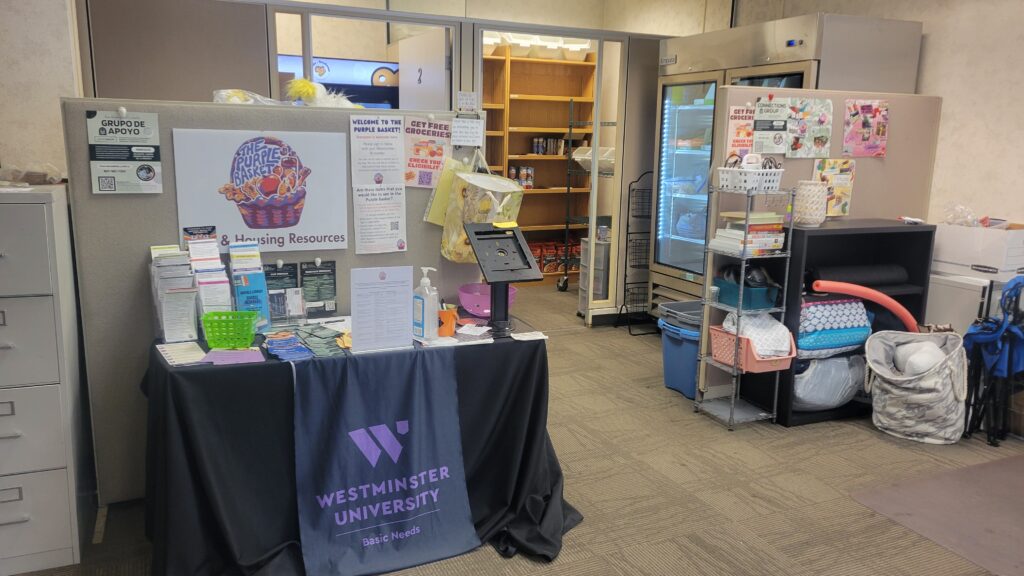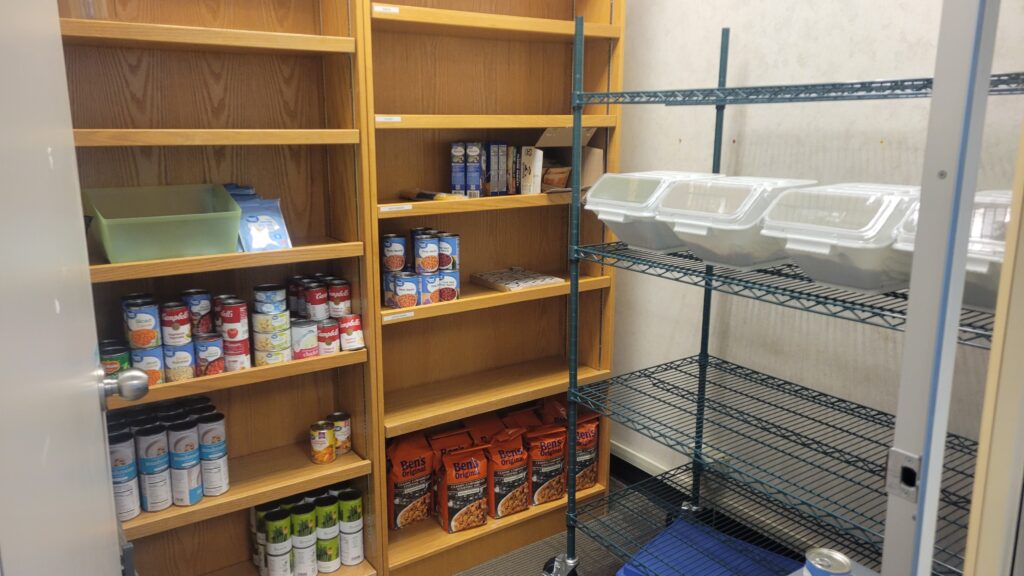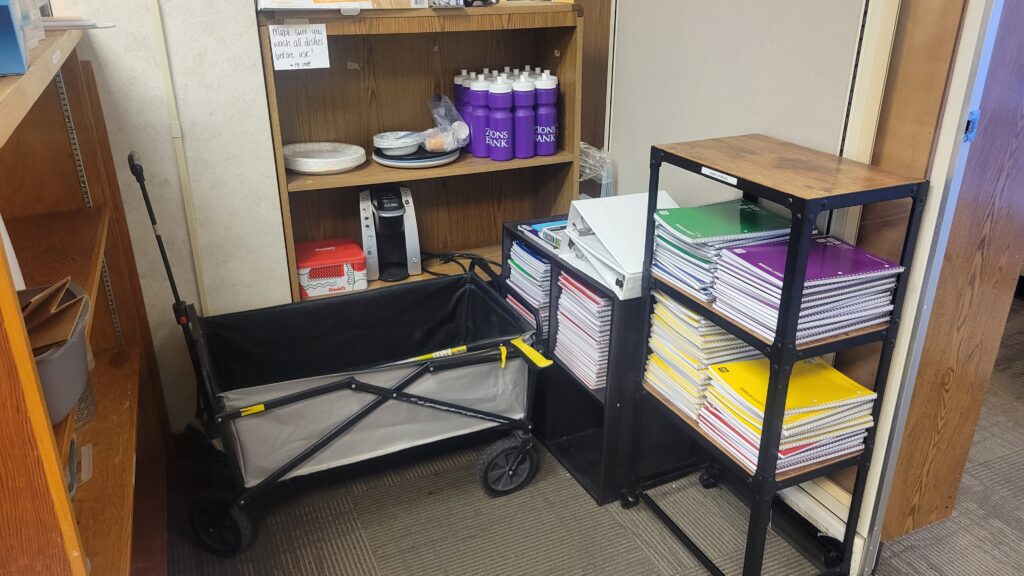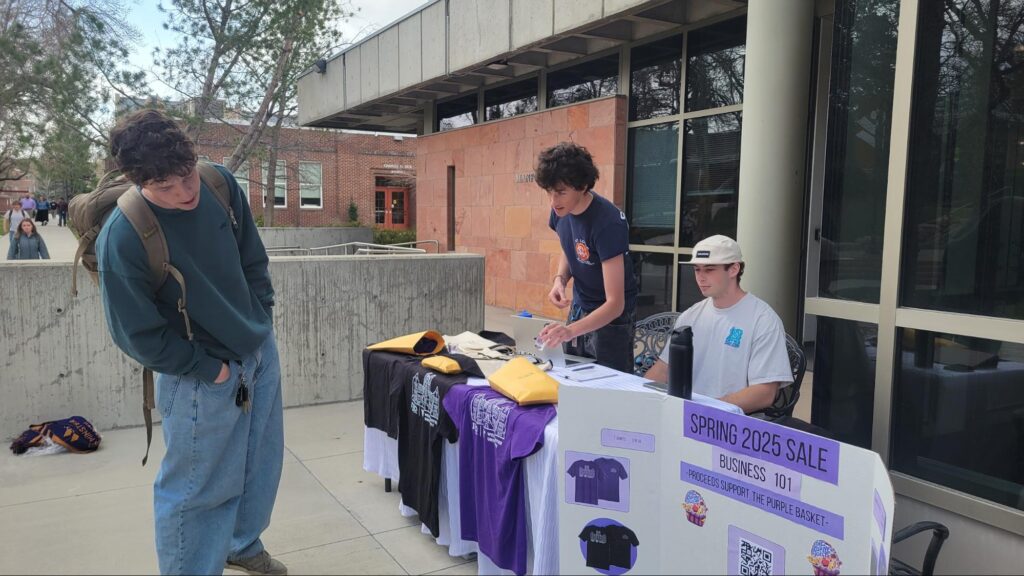The Purple Basket is running on 10% of its budget compared to past semesters according to Dean of Students Kellie Gerbers, who is temporarily overseeing the Purple Basket.
“The Purple Basket is a campus resource designed to assist students facing nutrition and food insecurity while enrolled at Westminster,” Gerbers said. “The Purple Basket is part of Westminster’s larger efforts to address short-term basic needs for students and build a community of care.”
Since the past year, a usual budget of approximately $25,000 has dropped to $2,500.
“I don’t want people to think that the institution doesn’t care about the Purple Basket or that they’re not funding the Purple Basket,” Gerbers said.

The Purple Basket runs on a “hybrid model of internal and external support,” Gerbers said. This means the facilities, space and staff that run the Purple Basket are funded by the university while the food and supplies itself are received purely through donations and grants.
This includes “funding a full-time Director of Student Care and Special Projects—one of the responsibilities of this position is to support the Purple Basket,” Gerbers said. “This position has been vacant for several months, but I’m happy to report that we will have a new Director of Student Care and Special Projects starting in mid-October.”
Student Opinions on Low Budget
Although things are looking up, many students have been expressing disappointment and distress at the lack of resources in the pantry.
“People are not happy, which is super fair,” said Meadow Gleichmann, a senior justice studies major who works at the Purple Basket front desk. “It surprised me, how many people are genuinely expressing distress to me when they come in and there’s no stuff.”
A priority of the Purple Basket is ensuring the staff create a welcoming and “no questions asked” environment so students don’t hesitate to grab what they need.
“Because there is a stigma around things like food pantries, I think people can be nervous about using it,” Gleichmann said.

Gleichman said that a topic that is not often addressed is food insecurity for college students. Many students could be facing food insecurity without knowing it.
“Food insecurity is kind of a harder thing to understand,” said Gleichmann. “So it can look a lot of different ways. For students, particularly if you find yourself skipping meals for whatever reason. That’s a pretty good indicator of food insecurity.”
Some students might be experiencing transitions such as financial struggle or moving off campus like Michael Clark, a junior and music major.
“I’ve definitely found myself affected by the budget cuts as a junior who recently moved off campus,” said Clark. “One thing that’s kind of been a struggle for me is balancing paying rent and also covering groceries.”
Clark said he visited the Purple Basket as a sophomore while living on campus for essentials, but he feels that after moving off campus, the Purple Basket was especially necessary.
“This year is the year I found myself needing it more than ever when I just couldn’t quite make a week’s worth of groceries,” said Clark. “I want other people who might even be on a tighter budget than myself to be able to also access the supplies the Purple Basket has. Now it feels like I sort of have to take just a few things to be able to justify that.”

Before the decrease in budget, Clark said the Purple Basket was valuable and well-run.
“I’ve never found there to be any problems with the way the basket has worked,” Clark said. “ I think it’s nice that a lot of the time the people who are working there are my friends, people who I know. So I usually feel very comfortable in the space. I never felt judged going there.”
“It’s just not quite as helpful now,” Clark said. “It’s still very helpful, but not quite to the same degree as in years past.”
Looking Forward
Although the budget cuts have been affecting students, Dean Gerbers asks students to have hope as many new developments are underway with the Purple Basket including the new Director of Student Care coming in mid-October, a new space coming in spring and community initiatives to raise funds and donations for the Basket.
“So while things have felt, probably fairly bleak for students over the last six weeks of the semester, the good news is that there is hope, right?” Gerbers said. “Things are trending positive versus negative. New space, new director, we have funding coming in and we are developing a plan as best we can to create shelf stable calorically-dense foods.”
Some of the community initiatives that have helped the Purple Basket is through fundraisers done by the Westminster community. The men’s lacrosse team did their annual car wash in September that raised $1600 for the Purple Basket.
The BUSI-101 class of the business school will be doing their bi-annual product selling project which raises an average of $500~$1000 each semester. With every round of this project, students select 4 or 5 products with the goal of making a profit of $125 dollars each product.

“Usually students tend to earn way beyond that,” said Alysse Morton, professor of management and part of the faculty that leads the BUSI-101 class. “Last spring, I think we may have donated $2500 to $3000 to the Purple Basket just from one semester across two sections.”
The BUSI-101 class of this semester is planning to start selling products on the week of Oct 20 with all proceeds going towards the Purple Basket.
“I think we felt like the community really appreciated that we were supporting people in our community who needed help,” Morton said. “And we agreed that was a good way to where we could donate our money and we know that it was helpful to the students who use the Purple Basket.”









